


Kamakura Jogakuin prides itself on having a well-established and highly successfully English language program. With 14 Japanese-English teachers and 4 native English speaking teachers, it is by far the largest department in the school. The overall goal of the department is to ensure that students are fully competent in all four language skills; that they are capable and confident communicating with native and non-native English speakers; and that they are able to express themselves in both the spoken and written form of the language. English is actively used by teachers and students in both the core classes and in the oral communication classes (taught by native English speakers) in order to create a more engaging and immersive language program.
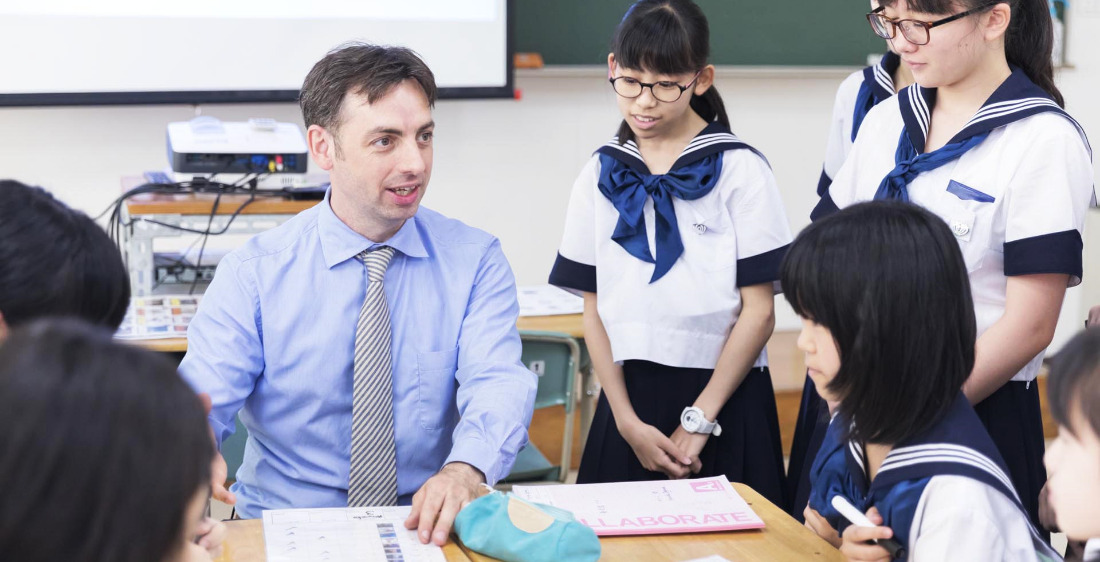
The Oral Communication (OC) English Program had been taught by native English speakers for over 45 years. This long history of English language teaching at our school is held in high regard by both students and parents alike. Classroom teaching always integrates speaking, listening, reading and writing skills into lesson activities and homework, but the emphasis is always on spoken communication, confidence and team building in order to engage the students actively and meaningfully.
The aim of each OC class is to provide our students with a clear context for communicating, a clear reason for listening and multiple opportunities for practice with a variety of other students whilst they are engaged in a range of different activities. Whilst the focus of the core English classes with the Japanese-English teachers is grammar, listening, reading and writing, the OC instructors are free to develop materials which encourage and develop age appropriate communication skills.
OC classes are interactive, purposeful, challenging and enjoyable. They create a real desire for students to interact with each other and support them to develop their language learning skills in a safe space.
From JHS Grade 1 through to the end of SHS Grade 1 students incrementally build their speaking skills and confidence by means of the following types of activities:
• Pair work
• Group work
• Pair interviews
• Group interviews
• Information exchanges
• Role plays
• Presentations
• Research projects
• Discussions
Topics are sometimes recycled in order to mark progress and boost confidence, but each grade syllabus sees students being introduced to new ways of working together in the classroom and with new tasks to achieve.
Typical topics covered over the course are the OC program are:
• Self-introductions
• Likes, dislikes and preferences
• Talking about future plans
• Talking about hobbies
• Talking about free time interests
• Comparing and contrasting personality types
• Summarising and reviewing movies
• Writing and presenting movie plots
• Researching and presenting countries around the world
• Discussing new year resolutions
• Describing appearances and speculating about personality
• Eliciting and giving opinions
• Responding to opinions with reactions and follow-up questions
• Discussing hyperthetical situations
• Discussing health and fitness
In SHS Grade 1, the language connected to these themes are covered in more depth and students are challenged to bring their language ability to a much freer classroom environment where they are expected to express opinions, show agreement and disagreement, give reasons and examples, make comparisons, respond appropriately to questions and comments and engage much more proactively with each other with much less teacher support.
Through the accumulation of the junior high school OC input in conjunction with their core English class content, we usually observe that by SHS Grade 1, students are much more independent and much more able to take leadership roles in small groups and achieve tasks in English more confidently and accurately.
Although the OC courses do not specifically teach towards exams, the themes, language expressions, vocabulary, interactive activities and life skills which make up the 4-year curriculum do help to prepare students for their Eiken (or equivalent tests).
From year to year, each grade is different in terms of motivation and ability. Generally speaking, the students can be grouped as shown in the table below. This assessment is based, primarily, on outcomes of activities and projects which demonstrate communicative competence in terms of speaking, listening and written expression. It has to be emphasised that there can be a great range from the weakest to the strongest student in each year group.
| M1-H1 Oral Communication | CEFR | EIKEN EQUIVALENT | IELTS EQUIVALENT |
|---|---|---|---|
| 1. M1 Oral Communication | A1 | Eiken 3 | - |
| 2. M2 Oral Communication | A1 – A2 | Eiken 3 and Pre-2 | - |
| 3. M3 Oral Communication | A2-B1 | Eiken Pre-2 and 2 | 4.0 Limited Ability |
| 4. H1 Oral Communication | B1 | Eiken 2 | 4.5-5.0 Limited Ability Moderate Ability |
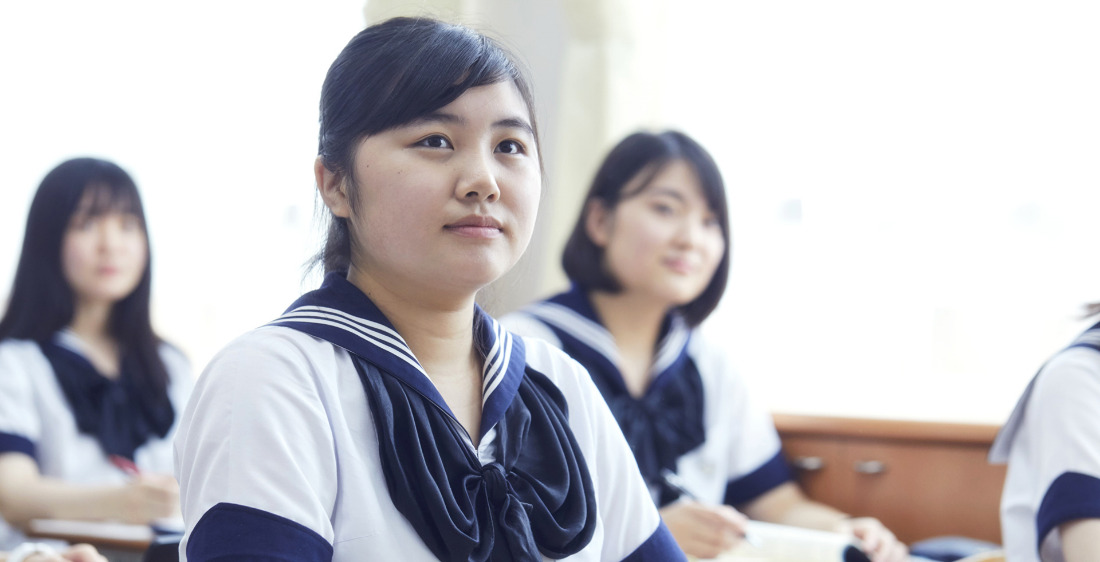
Once students reach SHS Grade 2 and SHS Grade 3, the Oral Communication and Returnee Program evolve into a two-period elective class. For those students who opt to take these elective classes, the aims are threefold:
This third aim plays an ever more important role on the elective courses as universities and the employers in the working world often demand that students and workers communicate and collaborate more efficiently and effectively; that they think more deeply; and that they become more involved in problem solving and decision making.
For this reason, the Global Studies courses integrate the following skills to better prepare our students for their future university and work experiences.
Each theme in the curriculum enhances, not just the students’ language ability, but also their ability to develop emotional intelligence and establish a clear set of values which will take them through life and support them to make better, logical and more reasoned choices.
Life skills integrated into the Global Studies Program include:
• Creativity and imagination
• Problem solving
• Decision making
• Self-knowledge
• Critical thinking
• Accessing and analysing information
• Communication
• Collaboration
• Time management
• Leading by influence
• Receiving and giving feedback
• Handling criticism
• Social responsibility
• Cultural awareness
• Respecting diversity
SHS Grade 2 Global Studies includes the following range of topics:
• Social Issues
• Technology
• University Applications
• The Environment
In each of these units, students have the opportunity to develop their ability to talk about societal issues; to expand vocabulary and collocations related to societal issues; to learn how to compare and contrast a range of social viewpoints from very conservative to very progressive; and to develop interview skills (relevant to speaking tests such as EIKEN and IELTS).
Students are also able to practise discussing the pros and cons of technology and SNS using their critical thinking skills, whilst also developing their confidence in sharing and presenting homework. The Global Studies courses don’t only focus on what is happening in the classroom, but also has as a goal the development of good study habits through regular manageable pretasks and preparation. Homework is an important course component and one which will prepare students for independent study at university and support them to develop a greater level of dependability and the ability to manage deadlines in the working world.
The University Application course was specifically developed to cater to the need for high school students to develop their ability to talk fluently about their high school experiences and achievements – often a requirement on paper and in interviews for entrance to university. Students are also encouraged to consider their personal traits and ambitions for the future and ‘sell’ themselves to prospective universities within an interview setting. The course also gives students the opportunity to compare and contrast a range of courses and universities; to role-play a university fair as both student and university promoter; and to write a university application form and develop interview skills (relevant to university, job and internship interviews).
With the Climate Crisis as a hot button topic, the Environmental Issues course is continually updated to engage students and develop their ability to talk about environmental problems and solutions. A secondary goal is, of course, to expand vocabulary and collocations related to the environment and so empower them to be able to compare and contrast a range of opinions and approaches to the environment.
SHS Grade 3 Global Studies includes the following range of topics:
• Meeting Skills
• Discussion Skills
• Speaking Test Skills
• Job Interview Skills
Global Studies in SHS Grade 3 continues to engage students in a wide range of social, cultural and environmental issues, whilst also focusing on developing those skills which will be useful not just for university life, but also in the working world.
The aim of the Meeting Skills unit is to familiarise students with how to play an active and meaningful role in a meeting with the goal of not only informing, but also persuading people to do something. Part of the meetings skills process is to study how to firstly research and analyse a topic, present and propose that topic at a meeting, discuss all the options and ultimately reach a group concensus and make a final decision. Students study specialist language used to compare and contrast ideas, express agreement and disagreement, ask for clarification and finally persuade people that their idea is the most suitable one for the group. Students have the opportunity to build their confidence in a meeting situation both as an attendee and a chairperson, thus developing their teamwork skills and their ability to lead and include people in the discussion.
The Discussion Skills unit gives students the opportunity to study and become familiar with three more social issues which hopefully encourage them to reflect upon the concept of respecting diversity. Through a range of classwork and homework activities, students are able to develop their ability to think critically; to improve their ability to think about all sides of an issue; to research one social issue in greater depth from both traditional and progressive perspectives; and to collaborate in small groups to plan and write a TV talk show which sees them taking on board the roles of host, guest and pro-active audience members.
In Job Interview Skills, students engage in researching and disucssing slum community and environmental issues and discuss possible solutions to local problems. This 2-part course leads into students making an application for a job with UN-Habitat to become an Urban Profiler whose job it is to upgrade slums in the developing world. Students are not only encouraged to brainstorm, discuss, analyse and then problem solve a range of social and environmental problems in order to improve living conditions in townships in developing countries, but also to understand how to read job applications, write effective resumes and cover letters, and apply for a job. Students ultimately participate in a job interview in rotating roles as interviewer, interviewee and selection panelists.
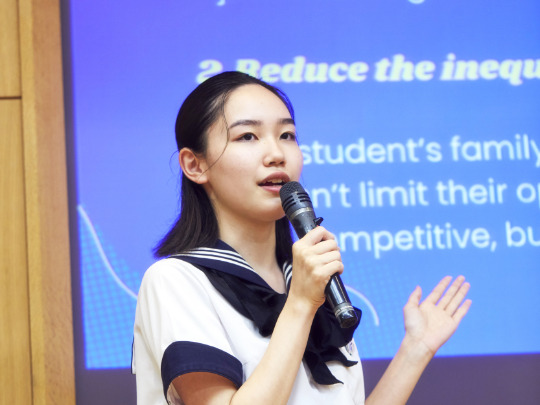
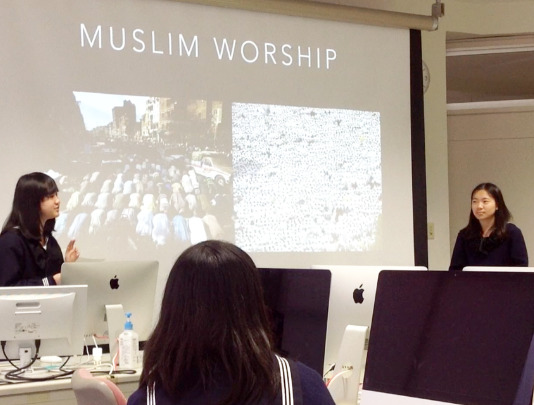
Kamakura Jogakuin is justifiably proud of the content and quality of all of its English language programs, but it is perhaps the Returnee Program which sets the school apart from most others in the Kanagawa region. This program consists of students who have either lived and studied abroad for a period of time, who come from multi-cultural households, or who have had the opportunity to study in international schools in Japan.
From Junior High School Year 1 until Junior High School Year 3, students participate in bi-weekly classes – one weekly class with their peers, and one weekly mixed class which includes students from all three grades. The program uses a wide range of in-house materials as well as highly engaging National Geographic Readers to enhance their grammatical knowledge and maintain their confidence and ability in communicating in English to a very high level. Materials are frequently updated to reflect the changing times, technology plays a significant role in the classroom, and materials are also easily adjusted to attend to the needs of each new group’s interests and/or abilities.
Throughout the Returnee Program, course content aims to give students the opportunity to initially learn how to develop healthy relationships in their school and with each other by discussing the most important qualities of friendship. Students also get the chance to discuss individual and common values and learn about the need to respect diversity going forward in Kamakura Jogakuin.
Further topics expose students to a range of content and activities which encourage them to develop their ability to express their opinions, show agreement and disagreement, understand how to problem solve and make considered decisions, with the overal goal being to assist students to develop their ability to analyse, reason and to make logical individual and group decisions.
As the program progresses, students are challenged to use a wider range of lexis, with a particular focus on idiomatic & figurative expressions, thus enabling them to communicate using a much more sophisticated grammatical range. This has the knock on effect of improving spoken fluency and interactive ability whilst also demonstrating to students what is required of them in order to exhibit a higher level of English ability in future speaking tests and/or professional situations.
The range of content and activities in each of the three years provide many opportunities for students to express degrees of certainty and probability, to speculate about the future, to draw conclusions, to justify, predict, explain and summarise thoughts and ideas in English. Creativity is encouraged throughout the program and students are challenged to bring the most they can to each lesson.
As well as improving their language ability, students can build their confidence and teamwork skills by engaging in activities such as:
• Pair discussions
• Group discussions and debates
• Show and tell presentations
• Keynote presentations
• Role playing performances
• Problem solving case studies
• Decision making activities
• Teacher-Student interviews and information exchanges
• Project work (including research and analysis)
Underlying all course content are life skills. The Returnee Program makes every effort to give students meaningful opportunities to practise and expand their language ability whilst at the same time incorporating activities which can support students to evolve and become:
• More organised and cooperative students
• More caring and compassionate people
• Independent and critical thinkers
• More research ready and analytical university students
• More employable and professional employees
In most of the Oral Communication courses, life skills are developed implicitly. In Returnee and Global Studies classes, however, these skills are taught more explicitly and students are required to show themselves capable of the exhibiting these life skills by means of group projects, discussions, presentations, role plays and interviews.
Building Friendships
Topic Talking: School
Topic Talking: Health
Topic Talking: Culture
Countries and Presentation Skills
Life choices
Language and Communication
Travel, Transport & Tourism
Christmas Around Europe
The People Who Influenced me
Personal Passions
AI & Philosophy
Childhood Memories
Celebrations & Festivals
The Environment
National Geographic Readers
Culture Topics
Film Studies
Case Studies
Presentation Skills
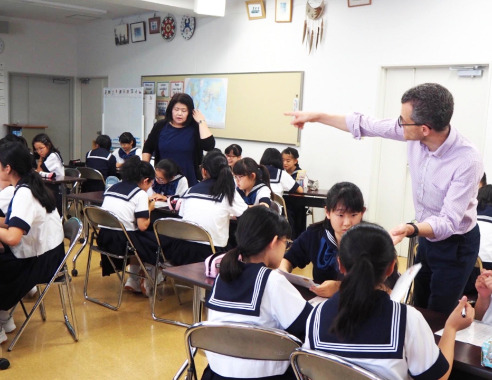
In additional to their regular classes, JHS Grade 1 and 2 also take part in monthly learning skills classes taught jointly by the Japanese-English and native English teachers. The Learning Skills Program is designed to help our students become better language learners, more aware, creative and co-operative in their English studies.
This program is taught in conjunction with a Japanese-English teacher and has proved to be highly popular with the students who enjoy being given the opportunity to do more dynamic activities through the medium of English.
Typical skills include showing students how to use the language of clarification to ensure smoother communication; how to paraphrase in situations where you are unable to recall specific words or structures; reading skills such as skimming and scanning; note-taking; and presentation skills to develop both oral and physical expression.
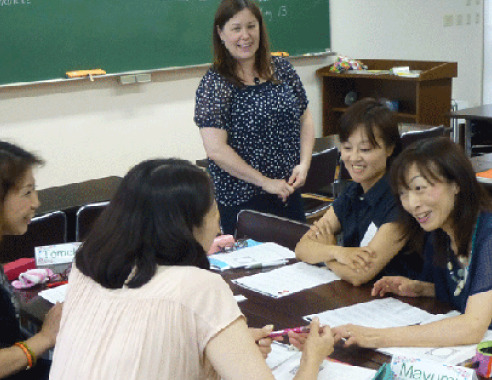
The Continuing Education Program (CEP) has been developed to provide parents with the same experience their daughters get in the OC classes.
It also gives them the unique opportunity to be exposed to the different teaching styles of the native English speaking teachers and to, hopefully, empower them to be more involved in and supportive of their daughters’ English studies.
Whilst the activities tend to be adapted to the appropriate level of the CEP class, they do retain the original objectives of the OC class.